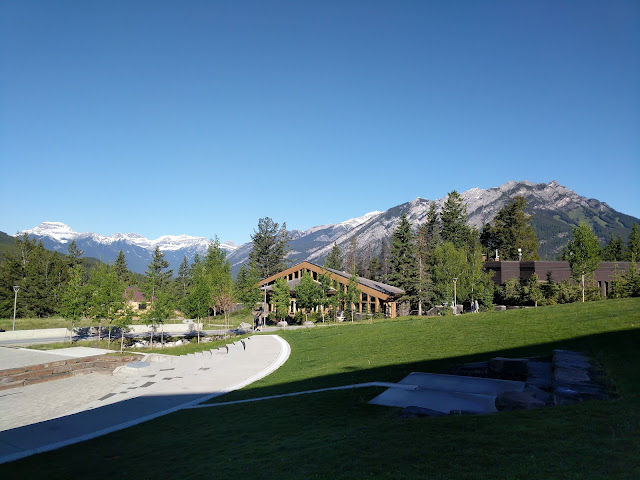This is a website for the Geobiology and Geomicrobiology Division of GSA
Monday, June 12, 2017
Friday, June 9, 2017
Postdoc in Paleoecology or Sedimentary Geology- University of Helsinki
The global biodiversity has changed dramatically during the past 550 million years of earth history with pronounced extinction events and times of spectacular diversifications. One hypothetical biotic driving mechanism of long-term change is ecological engineering (EE). In our project we will test predictions based on EE hypothesis by the example of the marine carbonate platforms of the early Paleozoic era (541–444 m.y.a.). During this time carbonate sediments globally expanded in neritic marine environments and at the same time marine organisms diversified rapidly. Because these carbonate platforms were built almost exclusively by benthic organisms we hypothesize that the development of carbonate platforms is an example of EE and that the biodiversification is partly causally linked with biologically driven habitat diversification. In a combined effort of an international team of geologists, ecologists, and paleontologists we will test with statistical, geochemical and stratigraphical methods if the early Paleozoic diversification is linked with coeval changes in marine benthic habitats.
The postdoctoral researcher will be employed on a full-time, fixed term, three-year contract with a four-month probation. The successful candidate will join an actively growing BioGeoScience Community at the University of Helsinki and will be part of the scientific community at both the Finnish Museum of Natural History and at the Department of Geosciences and Geography at the University of Helsinki. The successful candidate will also likely collaborate with Seth Finnegan (University of California, Berkeley), Lee Hsiang Liow (University of Oslo), and Melanie Hopkins (American Museum of Natural History).
They are seeking a highly motivated researcher with strong quantitative skills to work on one of the following themes: Analytical paleontology, macroecology, community ecology, and the statistical tools in paleobiological research, Carbonate sedimentology, carbonate sequence stratigraphy, basin analysis. The ideal candidate will have extensive experience either in paleobiological research or in carbonate sedimentology. However, as our research is cross-disciplinary it is possible to contribute coming from several different fields. Thus, we welcome applications from exceptional candidates, with a quantitative background, from other fields. However, it is essential to have a genuine interest in the interplay of global change in climate, sea-level and biodiversity. It is also important for the candidate to have strong programming skills and experience in working with large data sets.
Please submit your application as a single pdf file which includes:
• CV and list of publications
• contact details of two references (e.g. MSc/PhD thesis supervisors)
• a cover letter with a description of your research interests
More here: https://www.helsinki.fi/en/open-positions/postdoctoral-researcher-in-paleoecology-or-sedimentary-geology
The postdoctoral researcher will be employed on a full-time, fixed term, three-year contract with a four-month probation. The successful candidate will join an actively growing BioGeoScience Community at the University of Helsinki and will be part of the scientific community at both the Finnish Museum of Natural History and at the Department of Geosciences and Geography at the University of Helsinki. The successful candidate will also likely collaborate with Seth Finnegan (University of California, Berkeley), Lee Hsiang Liow (University of Oslo), and Melanie Hopkins (American Museum of Natural History).
They are seeking a highly motivated researcher with strong quantitative skills to work on one of the following themes: Analytical paleontology, macroecology, community ecology, and the statistical tools in paleobiological research, Carbonate sedimentology, carbonate sequence stratigraphy, basin analysis. The ideal candidate will have extensive experience either in paleobiological research or in carbonate sedimentology. However, as our research is cross-disciplinary it is possible to contribute coming from several different fields. Thus, we welcome applications from exceptional candidates, with a quantitative background, from other fields. However, it is essential to have a genuine interest in the interplay of global change in climate, sea-level and biodiversity. It is also important for the candidate to have strong programming skills and experience in working with large data sets.
Please submit your application as a single pdf file which includes:
• CV and list of publications
• contact details of two references (e.g. MSc/PhD thesis supervisors)
• a cover letter with a description of your research interests
More here: https://www.helsinki.fi/en/
Monday, June 5, 2017
Postdoctoral Research Fellow in Quantitative Ecology of Coral Reefs- Queensland
The School of Biological Sciences at The University of Queensland is seeking to fill a new Post-doctoral Research Fellowship in the Centre’s research program Ecosystem dynamics: past, present and future. This program brings together ecologists, evolutionary biologists, geneticists, oceanographers and palaeontologists to examine the dynamics of reefs across the full spectrum of scales from population dynamics to macro-evolution. They are interested in recruiting someone who can bring new perspectives and approaches to these disciplines. The successful appointee will have access to some ongoing support, and will be encouraged to apply for his/her own research funding. There are opportunities to work with large data sets and to be part of research teams, to address individually-developed and collaboratively-generated research questions, and to supervise honours, masters and doctoral students.
The school is seeking candidates with postdoctoral research interests in the long-term ecological dynamics of biological communities. The successful applicant will conduct empirical research into understanding the long-term ecological dynamics of reef coral communities using multiple large data sets at multiple temporal scales. As part of the Marine Palaeoecology Lab in the School of Biological Sciences and the ARC Centre of Excellence, the position duties are primarily related to the implementation of novel quantitative techniques applicable to time-series data that test fundamental ecological hypotheses in community ecology.
For more information, check out their website: http://jobs.uq.edu.au/caw/en/job/500700/postdoctoral-research-fellow-in-quantitative-ecology
To discuss this role contact Prof. John Pandolfi.
Applications close: 16 Jul 2017 (11:55 PM) E. Australia Standard Time
Subscribe to:
Posts (Atom)
